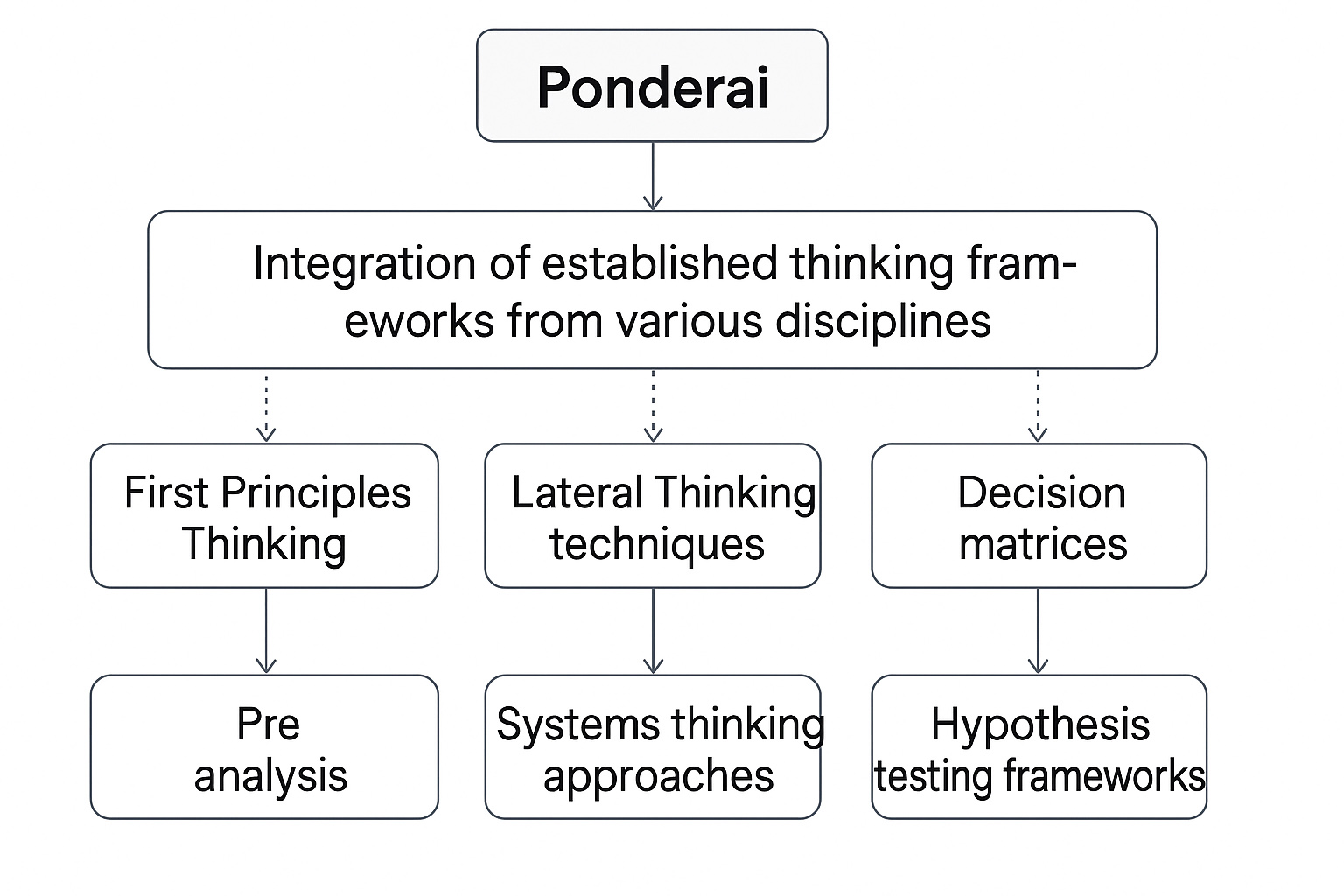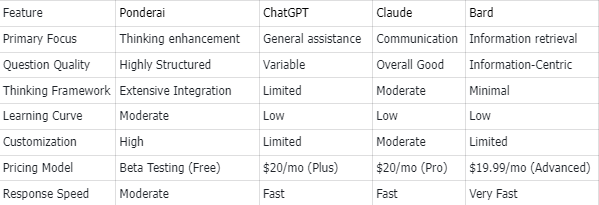
Discover the Power of Ponderai: Your AI Virtual Assistant


Discover the Power of Ponderai: Your AI Virtual Assistant
In the ever-evolving landscape of artificial intelligence tools, it's becoming increasingly challenging to find solutions that truly stand out from the crowd. However, Ponderai - a newcomer to the AI virtual assistant space - has been making waves with its innovative approach to augmenting human thinking capabilities. Today, I'm diving deep into what makes Ponderai different, how it works, and whether it lives up to its promises.
What Is Ponderai and Why Should You Care?
Ponderai is an AI virtual assistant designed with a unique mission: to help you think better. Unlike conventional AI assistants that simply provide answers, Ponderai focuses on enhancing your thinking process through thoughtful questions and structured exploration of ideas. This tool positions itself as a thinking partner rather than just an answer engine, aiming to transform how we interact with AI in our daily problem-solving and creative endeavors.
The fundamental philosophy behind Ponderai is that good questions lead to better thinking. By guiding users through methodical questioning frameworks, this AI virtual assistant helps unpack complex problems, challenge assumptions, and discover new perspectives that might otherwise remain unexplored.
But how does Ponderai actually work in practice? And is it genuinely different from the multitude of AI assistants already saturating the market? Let's find out.
Core Functionality: How Ponderai Transforms Thinking
The Thinking Partner Approach
At its heart, Ponderai operates on a different paradigm than typical AI virtual assistants. Instead of focusing primarily on providing answers, Ponderai emphasizes the journey of exploration through dialogue. When you present a problem or topic to Ponderai, it doesn't immediately jump to solutions. Instead, it engages you in a structured conversation designed to:
1. Clarify your thinking - By asking targeted questions about your initial thoughts
2. Challenge assumptions - By encouraging you to reconsider presuppositions
3. Explore alternatives - By guiding you through different thinking frameworks
4. Synthesize insights - By helping you integrate discoveries into coherent conclusions
This approach mirrors the Socratic method, but with the added advantage of AI's ability to maintain focus, remember context, and introduce relevant thinking frameworks at appropriate moments.
Thinking Frameworks Integration
Perhaps the most distinctive feature of Ponderai is its integration of established thinking frameworks from various disciplines. The AI virtual assistant doesn't just ask random questions; it intelligently applies methodologies like:
- First Principles Thinking
- Lateral Thinking techniques
- Decision matrices
- Pre analysis
- Systems thinking approaches
- Hypothesis testing frameworks
These aren't merely theoretical inclusions. Ponderai actively guides you through these frameworks in a conversational manner, making sophisticated thinking techniques accessible without requiring prior knowledge of the frameworks themselves.

According to internal testing data shared on Ponderai's website, users working with their AI virtual assistant experienced a 47% increase in considering alternative perspectives and a 39% improvement in identifying hidden assumptions compared to their usual problem-solving approaches.
Adaptive Conversation Flow
Another notable aspect of Ponderai's functionality is its adaptive conversation management. Unlike rigid chatbots that follow predetermined scripts, Ponderai adjusts its questioning strategy based on:
- The specificity of your responses
- Emerging patterns in your thinking
- The complexity of the problem at hand
- Your expressed preferences for exploration depth
This creates a remarkably organic feeling dialogue that maintains momentum while avoiding the common AI pitfall of repetitive or irrelevant questioning.
Hands-on Experience: Ponderai in Action
To really understand how Ponderai operates as an AI virtual assistant, let’s look at some real-world applications:
Case Study 1: Strategic Decision Making
The Marketing Director was evaluating whether to adjust their marketing strategy mid-quarter. Rather than simply asking for advice, they commissioned Ponderai to explore the decision space.
Ponderai guided them through the following:
1. Articulating key metrics that indicated a possible adjustment
2. Exploring potential cognitive biases that influenced their interpretation of the data
3. Considering second-order consequences of different adjustment scenarios
4. Developing specific criteria for evaluating success after making a decision
Rather than providing a simple “yes/no” answer, this process gave them a more nuanced understanding of the situation and a clearer framework for making decisions.
Case Study 2: Creative Problem Solving
The product designer was struggling with technical constraints in a new device. Rather than focusing solely on solutions, Ponderai helps students reframe problems by:
1. Questioning whether constraints are truly fixed or negotiable
2. Exploring similar problems in different industries
3. Applying conflict resolution techniques from the TRIZ methodology
4. Determining which user requirements are truly necessary and which are just nice-to-haves
This exploration leads to an innovative approach that transforms constraints into unique features rather than viewing them as limitations.
Ponderai vs. Competitors: How Does It Stack Up?
To evaluate Ponderai fairly, we need to compare it with other AI virtual assistant options in the market:

While all these tools can help with thinking tasks to some degree, Ponderai's dedicated focus on thought enhancement through structured questioning stands apart. However, this specialization comes with tradeoffs - Ponderai may not be as versatile for general tasks as more broadly designed assistants.
One significant differentiator is how Ponderai handles uncertainty. Rather than presenting speculative information as fact (a common issue with generative AI), Ponderai often turns uncertainty into an exploration opportunity, helping users develop comfort with ambiguity while still making progress on problems.
Industry Impact: Who Benefits Most from Ponderai?
Ponderai's unique approach to AI assistance creates varying impacts across different industries:
Positive Industry Impact
1. Education - Ponderai's questioning approach aligns perfectly with educational objectives, potentially transforming how students learn critical thinking. Teachers could use Ponderai as a supplementary tool for developing reasoning skills, though this raises questions about assessment authenticity.
2. Research & Development - R&D teams can benefit from Ponderai's ability to challenge assumptions and explore novel connections, potentially accelerating innovation cycles. The structured exploration of problem spaces aligns well with design thinking methodologies already common in this sector.
3. Strategic Consulting - Consultants can leverage Ponderai to enhance their problem-framing capabilities and ensure comprehensive exploration of client challenges before recommending solutions.
Potentially Threatened Industries
1. Traditional Decision Coaching - Professionals who guide decision processes without deep domain expertise may find their role partially automated by tools like Ponderai.
2. Basic Business Analysis - Routine analysis work that follows standard frameworks could be significantly augmented or partially replaced by Ponderai's systematic approach.
Controversial Applications
The use of Ponderai in political strategy development raises ethical concerns about the potential for creating more persuasive but potentially manipulative messaging. Similarly, its application in legal argumentation could amplify existing resource disparities in the justice system if only accessible to well-funded parties.
Technical Limitations: Where Ponderai Falls Short
Despite its innovative approach, Ponderai has several technical limitations worth considering:
1. Knowledge Constraints - While Ponderai excels at process guidance, its knowledge base appears more limited than some competitors. This can lead to exploration paths that miss important domain-specific considerations.
2. Conversation Management - In extended dialogues, Ponderai occasionally loses track of earlier insights or reintroduces previously addressed questions, disrupting the flow of thought.
3. Framework Rigidity - Though Ponderai adapts conversation flow, its underlying thinking frameworks sometimes feel rigid, occasionally forcing explorations into structures that don't optimally fit the problem.
4. Explanation Limitations - When suggesting a particular thinking approach, Ponderai doesn't always clearly articulate why that framework is appropriate for the specific situation.
5. Input Format Sensitivity - How you initially frame your topic significantly impacts the quality of Ponderai's guidance, creating inconsistent experiences between sessions.
These limitations don't negate Ponderai's value but underscore that it remains a tool requiring thoughtful application rather than a comprehensive thinking solution.
Practical and Ethical Concerns
Environmental and Resource Considerations
Like all AI virtual assistant systems, Ponderai requires significant computational resources. A single extensive thinking session with Ponderai likely consumes more energy than dozens of Google searches. While the company hasn't published specific sustainability metrics, users should be mindful that AI-assisted thinking carries environmental costs that traditional reflection doesn't.
Additionally, the computational requirements of running sophisticated AI assistants contribute to growing demand for specialized hardware, raising questions about resource allocation in the technology sector.
Ethical Implications
Several ethical considerations emerge when evaluating Ponderai:
1. Thinking Dependency - There's legitimate concern about cognitive outsourcing, where users might become dependent on AI-guided thinking rather than developing their own critical faculties. This is particularly concerning for educational applications.
2. Thinking Homogenization - As more people use the same AI virtual assistant with similar underlying frameworks, does this risk standardizing thought patterns across users? The potential narrowing of cognitive diversity presents a subtle but significant risk.
3. Data Privacy in Thinking - When we use AI to help us think through sensitive personal or professional decisions, we potentially expose our decision-making processes to third parties. Ponderai's privacy policies address data handling, but the intimate nature of thinking assistance creates unique privacy concerns.
4. Algorithmic Bias in Question Selection - The questions Ponderai chooses not to ask may be as important as those it does ask. Underlying biases in framework selection or question prioritization could subtly influence thinking directions.
Strategic Business Analysis
Ponderai’s entry into the AI virtual assistant market comes at a time of intense competition in the AI assistance tool market. Their focus on mind augmentation rather than general assistance reflects their strategic niche positioning.
From a business perspective, Ponderai appears to be targeting higher value professional use cases rather than competing for mass consumer adoption. This strategic decision allows them to focus on depth of functionality rather than breadth, but also creates challenges in expanding their user base.
Ponderai’s subscription pricing model is expected to be the same as larger, more comprehensive competitors, indicating that they believe their professional features deserve equivalent pricing. They are currently free in beta, reflecting their bet that users value quality of thinking rather than general utility.

Recommendations and Future Outlook
For Ponderai's Development
Based on current limitations, Ponderai could improve by:
1. Enhancing transparency around framework selection, explaining why specific thinking approaches are being suggested
2. Implementing better conversation memory to maintain coherence in extended thinking sessions
3. Developing domain-specific versions with tailored questioning strategies for fields like scientific research, product design, or business strategy
4. Creating collaborative features that allow multiple users to engage in AI-guided thinking sessions together
For Potential Users
If you're considering incorporating Ponderai into your workflow:
1. Start with well-defined problems rather than vague explorations to maximize value
2. Be prepared to redirect conversations when they drift into less productive territories
3. Use Ponderai as a complement to, not replacement for, human collaboration
4. Document insights separately, as Ponderai's conversation history features have limitations
For Potentially Affected Industries
Professionals whose work involves guiding thinking processes should:
1. Focus on developing deep domain expertise that AI assistants lack
2. Consider how AI thinking tools might augment rather than replace their services
3. Develop skills in selecting appropriate problems for AI assistance versus those requiring human-only consideration
FAQs About Ponderai
How is Ponderai different from standard chatbots and AI assistants?
Unlike general AI assistants, Ponderai focuses specifically on improving thinking processes through structured questioning and framework application. Rather than primarily providing information or executing tasks, it guides users through methodical exploration of problems and ideas using established critical thinking techniques.
Does Ponderai require technical expertise to use effectively?
No special technical knowledge is required, but getting maximum value from Ponderai does involve a learning curve in communicating your thinking challenges clearly. New users often need several sessions to understand how to effectively engage with the tool's questioning approach.
How secure is my data when using Ponderai?
According to Ponderai's privacy policy, conversation data is encrypted and not used to train their models without explicit permission. However, as with any cloud-based service, sensitive information should be shared cautiously, and users should review the current privacy terms before discussing proprietary or confidential matters.
Can Ponderai replace brainstorming sessions with colleagues?
While Ponderai can enhance individual ideation, it currently lacks the social dynamics and creative chemistry of group brainstorming. It's best viewed as a complement to human collaboration rather than a replacement, particularly for challenges requiring diverse perspectives or emotional intelligence.
Is Ponderai suitable for educational settings?
Ponderai shows significant potential for educational applications, particularly for developing critical thinking skills. However, educators should carefully consider how to implement it without creating dependency or undermining the development of independent thinking capabilities. Clear guidelines for appropriate academic use would be essential.
Conclusion: The Future of AI-Assisted Thinking
Ponderai represents an intriguing evolution in AI virtual assistant technology - one that prioritizes process over answers and exploration over certainty. Its approach aligns with the growing recognition that AI's value isn't merely in providing information but in enhancing human cognitive capabilities.
The strengths of Ponderai lie in its structured questioning methodology, integration of established thinking frameworks, and focus on the journey rather than just the destination of thought. For users willing to engage in genuinely collaborative thinking with an AI system, it offers a distinctly different experience from general-purpose assistants. Whether this represents the direction the broader industry will take remains to be seen, but Ponderai offers a compelling glimpse of what's possible when AI focuses not just on answering our questions, but on helping us ask better ones.
The question for potential users isn't simply whether Ponderai works as advertised, but whether its approach to AI assistance aligns with how you want technology to integrate with your thinking processes. Do you want an AI that thinks for you, or one that helps you think better yourself? If it's the latter, Ponderai deserves your attention.

Written by
Logan
"I’m not lost, I’m exploring."
User Reviews
Blog
Client-side Reviews
Reviews

Logan
"I’m not lost, I’m exploring."
Subscribe to Newsletter
No reviews yet. Be the first to review!